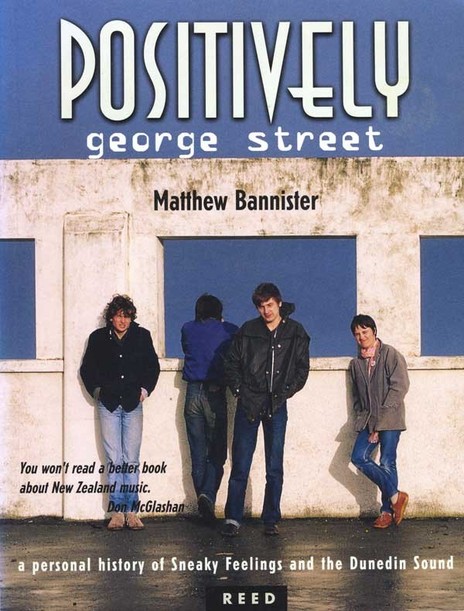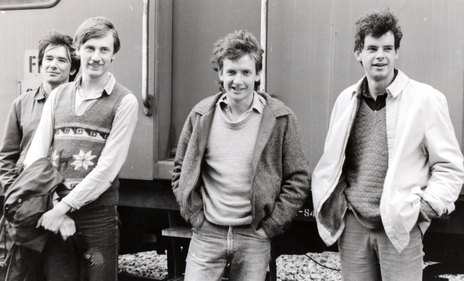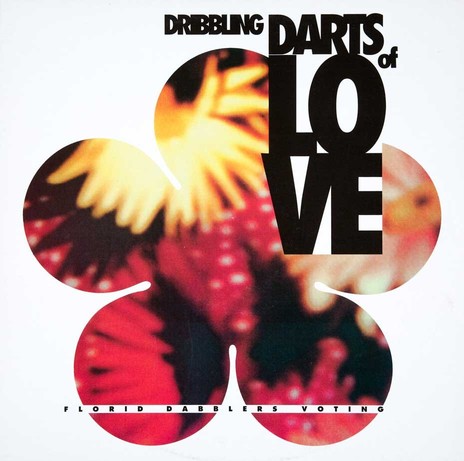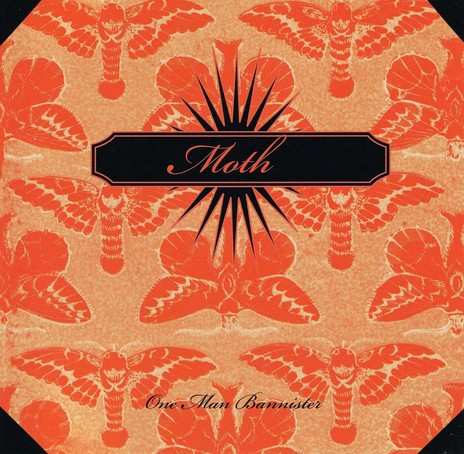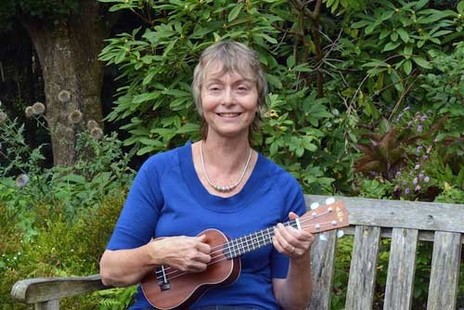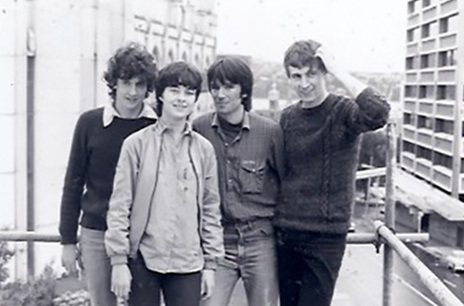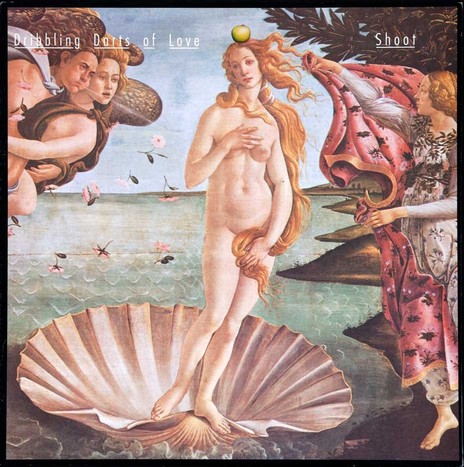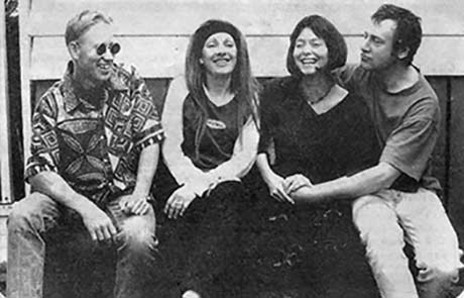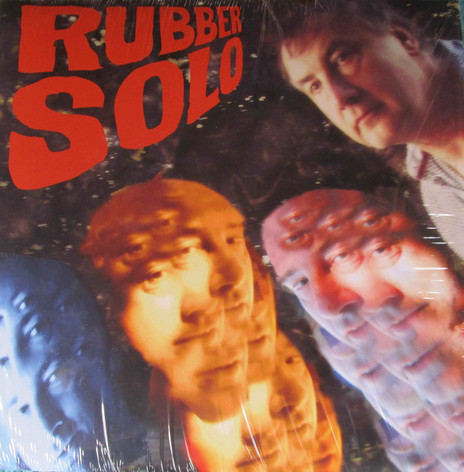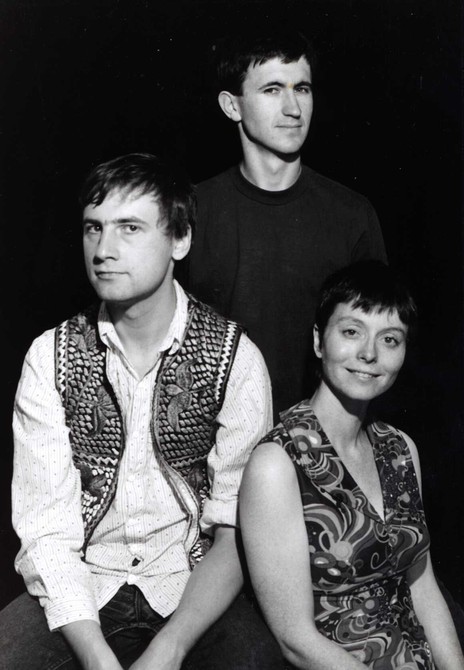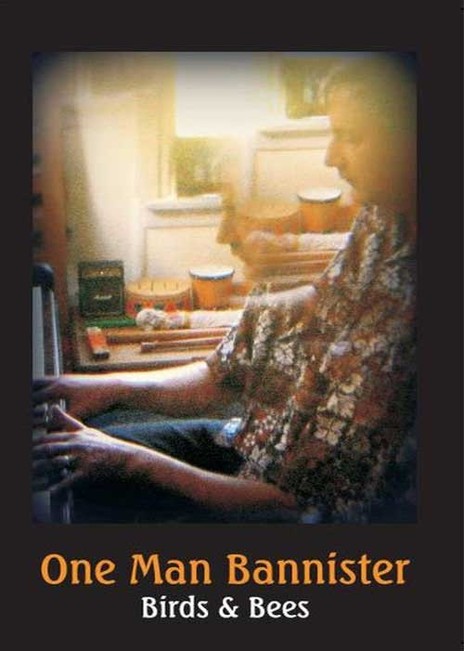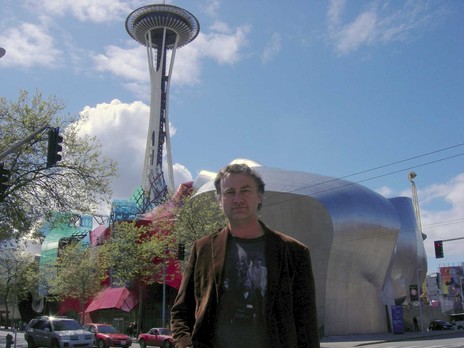Bannister was 17 years old and swimming the unfamiliar cultural waters of Otago Boys’ High. On his way to join the school guitar club he walked into David Pine. Pine pointed to Bannister’s guitar case and they started talking about music. Inspired, they decided to form a band.
But first Pine needed to learn the guitar, so while that was happening Bannister joined an established covers band called Feedback. While the music was not exactly Bannister’s thing, he found bandleader Gavin Keen something of a mentor, and in the band he gained a suitable education.
Bannister and Pine, now studying at University of Otago, put together a band they called Sneaky Feelings.
A little while later Bannister and Pine, now studying at the University of Otago, put together a band they called Sneaky Feelings, with Martin Durrant (drums) and Kat Tyrie (bass). On a trip to Christchurch in late 1981, they came to the attention of Roger Shepherd, who invited them to record for his fledgeling Flying Nun label. They contributed to the label’s 1982 Dunedin Double EP alongside The Chills, The Verlaines and The Stones and over the following six years recorded and released six singles and three albums of original material for the label.
The band’s first LP, Send You (1984) was generally well received both commercially and critically. For the second album, Sentimental Education, David Pine stepped back and Bannister stepped up. Contributing more than half the songs, drafting the arrangements and directing the recording process, this album was largely Bannister’s baby.
Drawing deeply from his love of sophisticated pop music, Sentimental Education (1987) was less Beatles (Bannister’s musical touchstone) and more Burt Bacharach, a composer Bannister had long admired and whose style had coloured his musical palette (alongside productions by Phil Spector, The Byrds, The Kinks and The Beach Boys’ Pet Sounds).
Those influences abound throughout the album, which is filled with strings, brass, lush harmonies and Hammond organ. Bannister described it as “Brill Building meets Burt Bacharach at the Village Green Preservation Society and then they all go surfing.” It went down like a lead balloon with many of the label’s inner circle, who had nothing but contempt for the group’s approach to music.
As the album was being prepared for release, Chris Knox (the label’s conscience and spiritual leader) famously said to the band: “I’ve heard your album, it stinks.” This statement, combined with poor sales and middling reviews (from the local press, although the British and European press were more enthusiastic) stalked Bannister for a long time, reinforcing his self doubts and uncertainties and confirming his belief that the audience preferred Pine’s words and melodies to his own. Bannister took it hard.
History has been much kinder to Sentimental Education and for other Bannister penned Sneaky Feelings songs.
History has been much kinder to Sentimental Education and for other Bannister penned Sneaky Feelings songs, notably ‘Husband House’, which was the subject of a loving article written by Canvas Magazine deputy editor, Greg Dixon. The album has been written about a number of times over the years by a variety of people who fell in love with it when it was released.
Sneaky Feelings’ last hurrah was a rather desultory 1988 European adventure that left Bannister washed up in Rennes, France, broke, bereft and alone (although they did tour NZ in 1989). He limped back to NZ and got a job at the University of Auckland library where he met multi-instrumentalist Alice Bulmer and found a new lease on life.
Bulmer replaced David Pine as Matthew’s main muse and together with The Mutton Birds bassist Alan Gregg they formed Dribbling Darts of Love, later shortened to Dribbling Darts. Bannister, a Shakespearian scholar, lifted the name from the play Measure for Measure.
With a succession of drummers – Richard Foulkes Jr, ex-Sneaky Feelings drummer Martin Durrant, and Ross Burge (another former Sneaky Feelings drummer and the other half of The Mutton Birds rhythm section with Alan Gregg) – Dribbling Darts released two EPs, Shoot (1990), Florid Dabblers Voting (1991) and the album Present Perfect (1993), scoring a Top 40 hit in 1994 with the single ‘Hey Judith’.
The Dribbling Darts faded away and music generally took a back seat as Bannister and Bulmer focused their attention on raising and supporting a family. Over the next few years Bannister worked as a journalist and music reviewer, checked the accuracy of crossword puzzles for The NZ Women’s Weekly and subedited (briefly) at RipItUp, scraping together a living however and wherever he could.
In the mid-1990s Bannister decided to write a book about Sneaky Feelings and get some stuff off his chest, while at the same time setting the record straight.
“I felt we were being written out of the label’s history and indeed out of indie history. For example our non-appearance in various articles about Flying Nun, in indie discographies, in local rock polls and worst of all, our exclusion from the 1991 Flying Nun 10-year retrospective Getting Older.”
Positively George Street was published and released in 1999 to strong reviews.
Positively George Street was published and released in 1999 to strong reviews. Part musical autobiography, part historical account, it examines place and time with irony, humour and at times squares off with Bannister’s critics within Flying Nun, notably Chris Knox. For Bannister the writing was more an exorcism that put to rest the ghosts of the past.
Suitably set free, Bannister returned to university to study for his PhD in media studies, graduating in 2003. His thesis later appeared as his second published book White Boys, White Noise: Masculinities and 1980s Guitar Rock (2006). He also played lead guitar for The Mutton Birds on their 1999 Antipodean tour.
Thirteen years after the last Dribbling Darts release, Bannister, Bulmer and their new band The Weather (with Mike Beck on drums and Paula Law on vocals and flute) went into the studio with producer Ed Cake. The result was Aroha Ave, a labour of love whose long gestation came close to being financially ruinous. Bannister describes working with the obsessive Cake both as joyous and exasperating. The album was completed in 2006 but did not see the light of day until 2008, by which time the Bannisters had moved to Hamilton where Matthew had secured a job as a thesis supervisor at Wintec’s Media Arts School.
With a small financial grant in hand, he had the album mastered at the Wintec recording studio by Zed Brookes, who also polished up a homemade solo album called Moth, released under the moniker One Man Bannister. Both albums, released on Andrew Maitai’s Powertool Records, received startlingly good reviews and while they did not exactly reignite his career, they certainly lifted his profile.
By this stage, the various members of The Weather had dispersed about the world so Bannister set to work on a new project called The Changing Same, with pianist Nick Johnston and drummer Stan Jagger, releasing a self-titled debut album on Powertool in 2011. One of Bannister’s ongoing musical themes concerns “place”(a theme that is partially informed by his fear of being alone) heard in tracks like the ‘Husband House’, The Weather’s ‘Aroha Ave’ and most recently with The Changing Same’s ‘Hillcrest’, a descriptive song of the Hamilton suburb where Bannister now lives and a song that has become something of minor city anthem alongside folk singer Chris Thompson’s ‘Hamilton’.
In 2011 Bannister watched with interest as his students tackled a recording project where they were assigned classic albums and asked to re-record them. One of the albums was The Beatles’ Revolver, which proved too difficult for those concerned and was abandoned but not before it had set Bannister’s creative mind into motion.
He decided to have a crack at it himself and the result was released in 2013 on Powertool Records to acclaim. Peaking at No.16 on the national album charts, One Man Bannister’s Evolver became his most successful post-Sneaky Feelings endeavour, both critically and commercially
“You release something original and the response is ‘ho hum’ but then you say ‘I have reinterpreted the Beatles’ and everyone is interested,” says Bannister.
The irony has not escaped an artist who has long struggled for recognition, but there was an upside. On the back of that success, he was approached by boutique German cassette label Thokei Tapes, which released the third One Man Bannister album, Birds & Bees, in 2015.
Bannister played excerpts from Evolver at the 2014 Hamilton Gardens Arts Festival, accompanied by a band and a 10-piece string section. There he was mesmerising, a towering figure belting out the tunes of his youth, the very songs that had set him on his musical course so many decades before.
You might say he had come full circle, but he hadn’t, not quite. The full circle came with the news that Sneaky Feelings had reunited and recorded an album of new material, due for future release, possibly alongside a re-issued Sentimental Education.
In 2019, Matthew followed Evolver with Rubber Solo, this time reinterpreting The Beatles' Rubber Soul.
--
Update:
His next project also drew from another artist’s work, but this time it was the 19th century poet Emily Dickinson. Bannister admitted that he always found lyrics the most difficult part of songwriting so enjoyed working with Dickinson’s taut writing style. Alice Bulmer played bass on the recordings and backing vocals were provided by two members of a ukulele group that Bannister plays in, Tangi Habib and Melissa Hackell. The resulting album, The Saddest Noise, came out in 2022.
– Update by Gareth Shute, 2023

